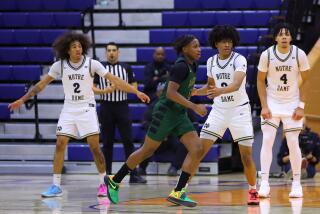Sooner, Later
- Share via
NEW ORLEANS — Ask quarterback Jason White why he has decided to return in 2004 for another season at Oklahoma when he has already won the Heisman Trophy and guided the Sooners to Sunday’s bowl championship series title game, when there seems to be nothing left to prove in college, when there are mouths to feed -- he and his girlfriend have a 1-year-old daughter, Tinley -- and the answer seems as simple as his upbringing in tiny Tuttle, Okla. (pop. 4,300).
“To do it again,” White said.
White’s intentions seem pure. He sees the talent Oklahoma will return, the number of teammates who probably will put off NFL careers to remain in college, and he wants to relive 2003, a season in which the Sooners won 12 in a row before losing to Kansas State in the Big 12 Conference championship game.
Though he will turn 24 in June, the 6-foot-3, 221-pound White, who completed 265 of 414 passes (64%) for 3,744 yards, 40 touchdowns and only eight interceptions, has been limited by injuries to 17 college starts. When the NCAA granted him an extra year of eligibility -- a sixth year in college -- White jumped at the opportunity.
“I don’t think he felt he had gotten everything he wanted out of college football,” said Chuck Long, Oklahoma’s offensive coordinator.
“He’s basically been a one-year starting quarterback. He’s gotten a great taste of it now, he was born and raised in Oklahoma, and he wants to stay in his home state. He feels loyal to the fans and the university.”
But bigger influences on White’s decision are the 10 scars, two screws and two hamstring grafts left after surgeries to repair ligaments in his left knee, which he injured in 2001, and the right knee, which he injured in 2002.
“I think he’s a good professional prospect, and his stock has gone up in the eyes of NFL scouts,” Long said. “But they also want to see one more year of health.”
Because of his injuries, NFL draft experts projected White as a fifth- or sixth-round pick this spring -- hardly a ringing endorsement for a Heisman Trophy winner -- but it’s not as if there has been any correlation between the Heisman and NFL success for college quarterbacks.
Vinny Testaverde (Miami, 1986) was the last Heisman-winning quarterback to have a decent NFL career, and Jim Plunkett (Stanford, 1970) was the last Heisman-winning quarterback who had a distinguished NFL career. The list since Plunkett reads not like a Who’s Who of quarterbacks, but a Whatever Happened To?
There’s Pat Sullivan (1971), Doug Flutie (1984), Testaverde, Andre Ware (1989), Ty Detmer (1990), Gino Torretta (1992), Charlie Ward (1993), Danny Wuerffel (1996), Chris Weinke (2000) and Eric Crouch (2001). Carson Palmer, the 2002 winner, didn’t play at all for the Cincinnati Bengals this season although many believe he will develop into a fine NFL passer.
So when White says, “Any player would be better with another year of experience, another year of learning -- you can always make yourself a better player,” there is reason to believe him.
“I think it’s a smart move,” said Barry Switzer, the former Oklahoma and Dallas Cowboy coach. “You don’t make any money in the fourth round, so it’s to his advantage to come back. He’s accurate, has a strong arm, throws the ball well downfield, and he’s smart. But the NFL is not going to take a chance on kids who have no knees. He needs to play more games, to prove himself physically.”
He does not have to prove his toughness. White has returned from two freak mishaps that came on plays in which he wasn’t even hit, against Nebraska in 2001 and Alabama in early 2002.
No stranger to hard work -- he spent many 12-hour summer days working for his father’s concrete company, hauling sacks of cement in wheelbarrows, shoveling sand and pouring concrete -- White went through two grueling, nine-month rehabilitation cycles before returning in 2003.
“This is one of the best stories ever in college football, just because of his perseverance,” Long said. “It’s a great lesson for young people to look at. You don’t realize what he went through rehabilitation-wise, both mentally and physically. That’s a long and lonely road if you’ve ever been through it.”
At the end of that road was this memorable Heisman-winning season, a BCS championship date with Louisiana State in Sunday’s Sugar Bowl, and the unending respect and devotion of his teammates.
“I don’t think there’s a guy on this team who wouldn’t walk through fire for him,” Oklahoma defensive end Dan Cody said.
Added fullback J.D. Runnels: “He’s been everything to us -- our leader, our captain, the gel that holds us together. He’s more mentally tough because he’s overcome so much. Anything that comes along during a game, he’s ready for it.”
If in the next year White develops into a first-round pick, he might look back at those two knee surgeries as providing an odd boost to his professional hopes.
“He was a very raw talent when he first got to Oklahoma,” Long said. “He was a run-around guy, very athletic, but he was not much of a pocket passer. He was a guy who would read one [receiver] and run.
“When he was hurt, he always put himself in the shoes of the other quarterbacks, dropping back and getting all those mental reps, which makes his story even more amazing, because for most of two years, he didn’t even get to practice.”
More to Read
Go beyond the scoreboard
Get the latest on L.A.'s teams in the daily Sports Report newsletter.
You may occasionally receive promotional content from the Los Angeles Times.











